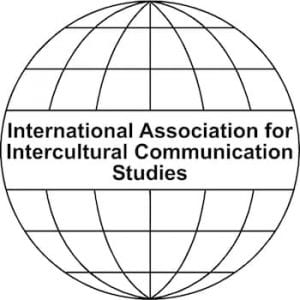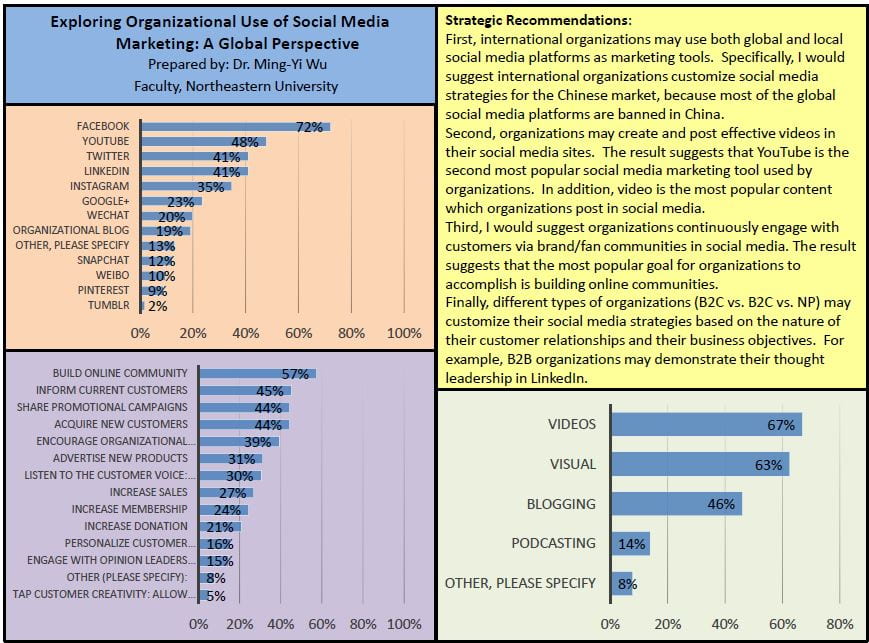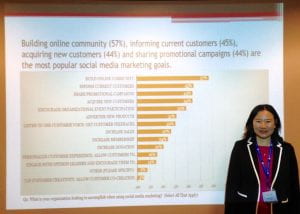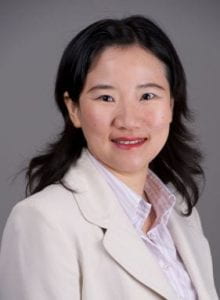 I was pleased to stand along with colleagues from 42 different cultures presenting their research at this year’s International Association for Intercultural Communication (IAICS) conference. It was my honor to present my research paper, Exploring Organizational Use of Social Media Marketing: A Global Perspective. I appreciate the support from Dr. Carl Zangerl and the Northeastern University Alumni Relations Office project. The data from my study was collected from 17 different cultures.
I was pleased to stand along with colleagues from 42 different cultures presenting their research at this year’s International Association for Intercultural Communication (IAICS) conference. It was my honor to present my research paper, Exploring Organizational Use of Social Media Marketing: A Global Perspective. I appreciate the support from Dr. Carl Zangerl and the Northeastern University Alumni Relations Office project. The data from my study was collected from 17 different cultures.
I found that Facebook, YouTube, Twitter, and LinkedIn are the most popular platforms used by organizations (see the graphic below). Organizations may use both global social media platforms and local social media platforms to communicate with key publics. Different types of organizations (e.g., B2C vs. B2B vs. NP organizations) may have different social media marketing goals and use social media marketing differently (Wu, 2018). 
Below are the key insights that I am eager to share from the conference.
 When I presented my paper at a social media panel, Professor Clyde Moerline from Amsterdam University, also presented his study, Online Reputation Management by Fashion Companies in the Netherlands. His research finding suggested that the most popular social media platforms used by fashion companies in the Netherlands are Instagram, Twitter, and Facebook (Moerline, 2018). It seems that many fashion companies use Instagram to post their product pictures in different cultures, including the U.S. and the Netherlands. But, it’s interesting to hear that fashion companies in the Netherlands considered Twitter to be more useful than Facebook. In terms of number of users, Facebook is most popular global social media platform worldwide. However, we need to keep in mind that there are still cultural variations in Facebook usage. I think it’s important for students to know that organizations in different industries may customize their social media marketing strategies based on the nature of their products, customer relations, and industrial trends.
When I presented my paper at a social media panel, Professor Clyde Moerline from Amsterdam University, also presented his study, Online Reputation Management by Fashion Companies in the Netherlands. His research finding suggested that the most popular social media platforms used by fashion companies in the Netherlands are Instagram, Twitter, and Facebook (Moerline, 2018). It seems that many fashion companies use Instagram to post their product pictures in different cultures, including the U.S. and the Netherlands. But, it’s interesting to hear that fashion companies in the Netherlands considered Twitter to be more useful than Facebook. In terms of number of users, Facebook is most popular global social media platform worldwide. However, we need to keep in mind that there are still cultural variations in Facebook usage. I think it’s important for students to know that organizations in different industries may customize their social media marketing strategies based on the nature of their products, customer relations, and industrial trends.
Dr. Shutter was the keynote speaking on Intercultural New Media Studies: The New Frontier in Intercultural Communication. When reflecting on his talk and the global trend, I propose intercultural communication researchers further intersections between two disciples, intercultural communication and communication technology. Additionally, his talk prompted me to think about a course I teach, CMN6015: Introduction to the Digital Era: The Power of Social Media in our Organizational and Corporate Communication Graduate Program. It’s important for students to know that there are cultural variations in social media usage at both personal and organizational levels.
Finally, I think it’s a global trend for universities to incorporate intercultural communication competence/ICC and global awareness in their curriculum. I know many universities in the United States have intercultural communication or global communication courses in their curriculum, because there are many global organizations with headquarters in the U.S. There are also many international students in the U.S. But, it’s interesting to know that Universities in other cultures, such as China, also make efforts to incorporate intercultural competence into their curriculum. Because of the rapid economic growth in China, many international students from different parts of the world, such as Europe, America, Asia, and Africa, go to China to study. Many global organizations also want to establish divisions, offices, and factories in China. Thus, Chinese universities want to make sure that their students have intercultural communicate competence, such as open-mindedness, and awareness about global issues, such as global environmental issues. For example, Professor Dinghong Fan from Chongqing University in China presented his paper, Developing Global Awareness and Intercultural Competence through a General Education Undergraduate Course. Professor Fan mentioned that there is an urgent need for university educators to strengthen students’ global awareness and intercultural competence so that students will have the knowledge and skills to be successful in the global village. The aim of this general education, elective course is to enable students to communicate inn English more effectively while developing their knowledge and understanding of global issues, as well as intercultural knowledge and understanding (Fan, 2018).
After attending several intercultural communication panels at IAICS conference, I took a look at our graduate program’s Cross-Cultural Communication Graduate Certificate Program. I feel our courses in this graduate certificate program reflects the global trend. Specifically, we have two required courses, Developing Cultural Awareness and Foundations course and Strategies for Cross-Cultural Facilitation and Negotiation course. These two courses can strengthen our students’ intercultural communication competence and increase our students’ knowledge about global issues. In addition, there are two tracks, social justice track and international track, for students to choose from. Students can choose the track which meets their personal and professional needs. Thus, I really think our Cross-Cultural Communication Certificate Program is well-designed and reflects the global trend.
It’s my pleasure to share my experiences and thoughts with you!
References
Fan, D. (2018, July). Developing Global Awareness and Intercultural Competence Through a General Education Undergraduate Course. Paper presented at 2018 International Association for Intercultural Communication Studies (IAICS) Annual Conference, Chicago, IL.
Moerlie, C. A. (2018, July). Online Reputation Management by Fashion Companies in the Netherlands. Paper presented at 2018 International Association for Intercultural Communication Studies (IAICS) Annual Conference, Chicago, IL.
Shutter, R. (2018, July). Intercultural New Media Studies: The New Frontier in Intercultural Communication. Keynote Speech presented at 2018 International Association for Intercultural Communication Studies (IAICS) Annual Conference, Chicago, IL.
Wu, M. Y. (2018, July). Exploring Organizational Use of Social Media Marketing: From a Global Perspective. Paper presented at 2018 International Association for Intercultural Communication Studies (IAICS) Annual Conference, Chicago, IL.

Posted by Ming-Yi Wu, Faculty
Found myself looking at it for hours.
Thank you, Kenny.
Found myself looking at it for hours.